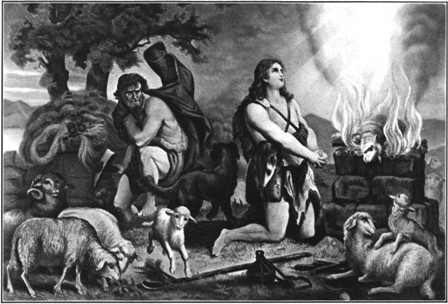From Genesis 4-7
Abel and Cain give offerings to the LORD. The Lord has regard for Abel and his offering only and soon later Cain murders his brother. A dialog with the LORD ensues, ending in Cain’s punishment. Sin has entered the world. Now death.
This post is part of my bible in a year series.
Passage and Comments
Adam and Eve have eaten from the tree of knowledge of good and evil. Now their children get into trouble. Sin has entered the world. In today’s passage someone dies.
4 Now Adam knew Eve his wife, and she conceived and bore Cain, saying, “I have gotten a man with the help of the LORD.” 2 And again, she bore his brother Abel.
Now Abel was a keeper of sheep, and Cain a worker of the ground.
3 In the course of time Cain brought to the LORD an offering of the fruit of the ground, 4 and Abel also brought of the firstborn of his flock and of their fat portions.
And the LORD had regard for Abel and his offering, 5 but for Cain and his offering he had no regard. (Gen 4.1-5)
‘Adam knew Eve’. The term expresses intimate knowledge. They had sex.
‘Offering’. Abel is a keeper of Sheep and Cain a worker of the ground. They both bring the LORD offerings in the course of time.
What would you offer the LORD?
‘Regard’. The LORD has ‘regard’ for Abel’s offering, but not for Cain’s.
So Cain was very angry, and his face fell. 6 The LORD said to Cain, “Why are you angry, and why has your face fallen? 7 If you do well, will you not be accepted? And if you do not do well, sin is crouching at the door. Its desire is for you, but you must rule over it.” (Gen 4.5-7)
‘Very angry’. Cain is angered and grieved that Abel’s offering was accepted and his was not. The LORD responds, kindly giving him some advice to rectify the situation.
If you do well, will you not be accepted?
‘Do well’. The text indicates that if Cain ‘did well’ he would be accepted, not just the offering. Presumably both know who the LORD is, but only Abel ‘does well’. The expression points towards his actions. His righteousness. If we look to the New Testament, Abel is described as righteous and commended for his offering (Mt 23.35; 1 Jn 3.12; Heb 11.4). Cain is not (Heb 12.24; Jude 11).
 ‘Sin is crouching’. If Cain does not ‘do well’ there is inherent danger that we could assume those who do ‘do well’ are exempt from. ‘Sin is crouching at the door’. The imagery conjures up a lion at someone’s door trying to get in to kill and eat. If he does not do well he must master (‘rule over’) this beast.
‘Sin is crouching’. If Cain does not ‘do well’ there is inherent danger that we could assume those who do ‘do well’ are exempt from. ‘Sin is crouching at the door’. The imagery conjures up a lion at someone’s door trying to get in to kill and eat. If he does not do well he must master (‘rule over’) this beast.
8 Cain spoke to Abel his brother. And when they were in the field, Cain rose up against his brother Abel and killed him. (Gen 4.8)
‘Killed him’. Still angry and grieved Cain rejects the Lord’s instruction. He lures his trusting brother into a trap and kills him.
9 Then the LORD said to Cain, “Where is Abel your brother?” He said, “I do not know; am I my brother’s keeper?” 10 And the LORD said, “What have you done? The voice of your brother’s blood is crying to me from the ground. (Gen 4.9-10)
‘Where is Abel?’ The LORD gives Cain an opportunity to confess and perhaps repent. Cain rejects the LORD with a disrespectful remark. Does Cain look after Abel like a shepherd his sheep?
Yes people are responsible for caring for one another.
‘Brothers blood’. The LORD condemns Cain for what he has done. He can hear his brothers blood crying out to him on the ground. Sin leaves a trail (1 Tim 5.24).
11 And now you are cursed from the ground, which has opened its mouth to receive your brother’s blood from your hand. 12 When you work the ground, it shall no longer yield to you its strength. You shall be a fugitive and a wanderer on the earth.” (Gen 4.11-12)
‘Cursed’. Cain’s first punishment echoes Adams (Gen 3.17-18) as the ground will not yield its strength. He will not get as much return for his labour. It will be harder to work. Crops will fail.
‘Fugitive’. Cain will have to flee various peoples and live on the run as a wanderer. Cain complains.
13 Cain said to the LORD, “My punishment is greater than I can bear. 14 Behold, you have driven me today away from the ground, and from your face I shall be hidden. I shall be a fugitive and a wanderer on the earth, and whoever finds me will kill me.”
15 Then the LORD said to him, “Not so! If anyone kills Cain, vengeance shall be taken on him sevenfold.” And the LORD put a mark on Cain, lest any who found him should attack him. 16 Then Cain went away from the presence of the LORD and settled in the land of Nod, east of Eden. (Gen 4.13-16)
‘Punishment’. Cain is fearful of the punishment, listing a couple implications. Cain will be hidden from the LORD. They will no longer have fellowship. Whoever finds him will kill him. His protest is a plea to lighten the punishment.
‘Marked’. He will be marked as a warning that those who think about killing him will know they will suffer sevenfold for it.
Story of Israel

Cain isn’t the only one who offered unacceptable sacrifices (Lev 10.1; Num 3.4; 26.61; Ps 40.6; 50.8; 51.16; Isa 1.11,13; Jer 6.20). The core issue throughout Israel’s history is the heart. They did not care for the LORD. They were simply going through the motions. They had no faith or trust in God. Their lifestyles reflected their heart. Some recognised the LORD needed more than a sacrifice to appease him (Ps 4.5; 20.3).
Story of Jesus
In the gospel, Jesus condemns the scribes and Pharisees. He draws upon Israel’s history of murder and makes some stinging accusations.
29 “Woe to you, scribes and Pharisees, hypocrites! For you build the tombs of the prophets and decorate the monuments of the righteous, 30 saying, ‘If we had lived in the days of our fathers, we would not have taken part with them in shedding the blood of the prophets.’
31 Thus you witness against yourselves that you are sons of those who murdered the prophets. 32 Fill up, then, the measure of your fathers. 33 You serpents, you brood of vipers, how are you to escape being sentenced to hell?” (Mt 23:29–32)
God hears the blood of his people crying out to him for justice.
Copyright © Joshua Washington and thescripturesays, 2016. All Rights Reserved.






